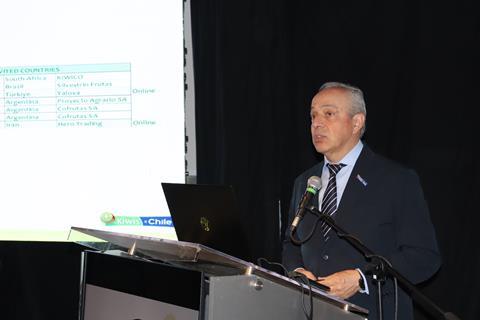Annual convention in Chile ends with agreement to deepen cooperation to face common challenges
Kiwifruit growers and exporters from around the world gathered in Curicó, Chile last week for the 42nd Convention of the International Kiwifruit Organization” (IKO).

IKO representatives from Spain, Portugal, France, Italy, Greece, the US, New Zealand, and Chile, as well as guest countries Argentina, Brazil, South Africa, and Turkey provided a detailed analysis of the situation in their respective markets.
Carlos Cruzat, president of the Chilean Kiwifruit Committee, who hosted the event, said it was an opportunity to better understand where the industry is going and how to strengthen cooperation between the participating countries.
“There was consensus and concern that climate change presents a challenge for kiwifruit production globally. Added to all this is the lack of workers and high production costs, especially in Europe, where the effects of the war between Ukraine and Russia have been most pronounced, and inflation which is impacting consumption of kiwifruit and lowering returns for the producer,” he said.
On the issue of climate change, French representative Marie-Jose Sanz commented: “The kiwifruit production cycle has changed and by doing so we encounter problems at times that we did not have before. For example, spring frosts. It is an issue that we are working on and we must continue working on”.
On the plus side, both Cruzat and Asoex president Iván Marambio noted that awareness of the health attributes of kiwifruit had increased during the pandemic and that this should be seized as an opportunity to increase consumption through targeted health messaging in promotional campaigns.
Carlos Vila, the IKO’s Spanish representative, pointed out that while it would be difficult to grow consumption in a mature market like Europe, there is still plenty of potential in the US, where consumption levels are lower.
“We have no doubt that if the US were to increase its consumption it would help global sales of kiwifruit,” he said.
In terms of production, Cruzat observed the trend for decreased output in the Southern Hemisphere, especially in green varieties, alongside growth in yellow and red varieties, particularly in Chile and New Zealand.
Highlighting the challenge of soaring costs, Greek representative Zisis Manossis said: “Production costs for growers are very high, as is the case with fertilisers, gas and electricity. At the same time, there is a shortage of workers. These are factors that ultimately affect us all”.
Patrizio Neri, the representative of Italy, pointed out: “Since 2021 in Europe there has been a general decrease in the consumption of fruits and vegetables, a decline that was more pronounced in 2022, and the first half of 2023, due to a drop in purchasing power, as a result of inflation, results from a lack of products and a drop in the general production of fruits, which has also influenced a drop in consumption and returns.”



